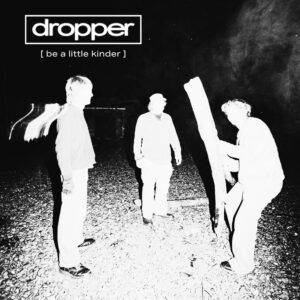Interview: Little Steven – That Rock & Roll Fire Is Still Burning
Little Steven Van Zandt is headed to New Zealand next month and he’s bringing his 14-piece Disciples Of Soul band with him.
In addition to his guitar and production work with Bruce Springsteen, Little Steven is known for his songwriting (Southside Johnny & Asbury Jukes), his acting (The Sopranos), his radio show (Underground Garage) and his philanthropy.
But don’t forget his solo work!
With Bruce taking time off the road, Steven has time to concentrate on his solo career, releasing his Soulfire album in 2017 and readying his next, Summer Of Sorcery, for a May 2019 release.
The 13th Floor’s Marty Duda spoke to Little Steven a short while ago and they touched on a range of subjects from Hal Blaine and Sam Cooke to Michael Jackson and his thoughts on how to separate the art from the artist. Little Steven also reveals the record that ignited his passion for rock & roll.
Click here to listen to the interview:
Or, read a transcription here:
MD: So, I’m just wondering – have you played in New Zealand before? As a solo artist? I know you’ve been here with Bruce.
LS: No – no. Yeah, we came to it with Bruce last time. But no, this is the first time with the Disciples of Soul, so. It’s very exciting.
MD: And you’ve got like a 14-piece band, right?
LS: It’s all the best New York guys – same guys who did the Soulfire album, it was, you know, I was very lucky to be able to keep the band together for this past year and a half, and uh – we’ve been trying to get down there for a couple of years now, but finally – we finally did it. And when you see this band, it’s gonna blow your mind, cause they’re just so good. It’s a fun show.
MD: Can’t wait. So, I mean – is it – is most of your stuff drawn from your most recent album? I know you have a new album in the works, so what can we expect as far as…
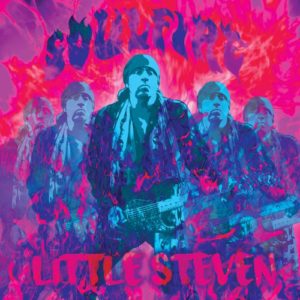 LS: It’ll be the Soulfire show we’ve been doing this last year and a half. That entire album, and then some of the songs I’ve written for other people, some of the songs I’ve written for Southside Johnny & The Ashbury Jukes and a few others that I’ve written through the years, and we’ll do one or two songs from the upcoming album also, just to give a little taste of it.
LS: It’ll be the Soulfire show we’ve been doing this last year and a half. That entire album, and then some of the songs I’ve written for other people, some of the songs I’ve written for Southside Johnny & The Ashbury Jukes and a few others that I’ve written through the years, and we’ll do one or two songs from the upcoming album also, just to give a little taste of it.
MD: Cool, cool.
LS: But it’ll be – the bulk will be the Soulfire show that we’ve been doing.
MD: Excellent. What can you tell me about the new album? I know it’s called….let’s see, I’ve got it written down here…Summer of Sorcery, but that’s about all I know.
LS: Well, it’s very different for me. I’m quite proud of it – all my 80’s records, all my past records, have been very, very autobiographical and very political. And doing the Soulfire album, which was all covers, was really quite a revelation, for me, ‘cause I realize, I write very differently for other people than I do for myself. And I – you know, I’ve said what I wanted to say, as far as the autobiographical stuff, I’ve kind of learned everything I needed to learn about myself, and – I mean, you never stop learning completely, but – you know, most of what I’ve wanted to learn I’ve learned about how the world works, and I’ve talked about every political subject, you know, on the planet, and so I said, you know what? I really like the way I write for other people, and I want to start writing that way for me.
MD: Right. Makes sense.
LS: So, um, so that was the goal, and touring for a year really helped that, because it put me in that place where I could evolve what we were doing. It was the same band, and it was the first time in my life I’ve done two albums in a row with the same band, and that’s why I was able to do it. It really took me – it’s more of a fictionalized album, with a loose concept of summer, and the sorcery part is that first time that you really fall in love. That opening summer – that first summer of consciousness, in a way, and you’re in love with life – trying to recapture that feeling. That’s where the album began.
And you know, there’s a little, little bits and pieces of autobiographical stuff in there, and bits and pieces of politics, but mostly not. So I was very – quite proud of it. You know, I’ll do a song or two from it in the show, but we’ll mostly do the Soulfire show.
MD: Cool, cool. And the new album’s coming out in May, is that right?
LS: Yeah. Yeah. Just after we leave.
MD: I noticed that you have, – I was looking at your Twitter feed today, and you interact a lot with your fans. And there seems to be a constant discussion back and forth about between Leo Fender and Les Paul, or who the best guitar player is…
LS: [Laughs] You picked a weird day, cause you know… the thing is, I was attacked by somebody for not even saying, for something I didn’t say! I was talking with Eric Carmen, you know, about Hal Blaine, and I said – Eric is right. And then, somebody had sent [a tweet of] Eric Clapton saying Prince was the greatest guitar player in the world, so people thought I was talking about Eric Clapton, saying that Prince is the greatest guitar player! [Both Laugh] And I get more trouble on Twitter than it’s worth, I tell ya. I don’t know why I bother… It is fun, though, talking directly to people. It’s such a unique technology, that I can’t quite take it for granted, you know, even if I get into trouble every month or two, I get in trouble.
MD: Speaking of Hal Blaine, who just obviously just passed away a couple days ago, did you have any thoughts about him? Did you ever interact with him, work with him?
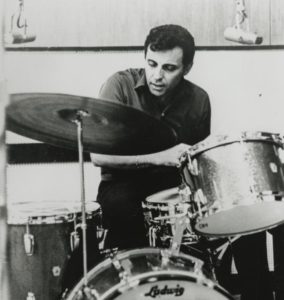 LS: You know, unfortunately, no. I never actually met him, even though I did go to one Phil Spector session, and he was there. But I didn’t actually meet him, unfortunately. But we did correspond. He would send out jokes – he emailed jokes to people. So he would send me jokes every week or two. He sent me a joke a month ago, or something.
LS: You know, unfortunately, no. I never actually met him, even though I did go to one Phil Spector session, and he was there. But I didn’t actually meet him, unfortunately. But we did correspond. He would send out jokes – he emailed jokes to people. So he would send me jokes every week or two. He sent me a joke a month ago, or something.
MD: I did meet him, and interviewed him once, and he fancied himself quite the stand-up comic, didn’t he.
LS: Oh, definitely. He was the comic of the Wrecking Crew, and he was pretty funny. He was funny. What a resume.
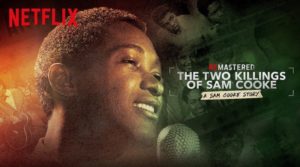 MD: I know you’re a student of the music – have you seen the Sam Cooke bio that’s out, the Two Killings of Sam Cooke –
MD: I know you’re a student of the music – have you seen the Sam Cooke bio that’s out, the Two Killings of Sam Cooke –
LS: Terrific. Yeah…yeah, it’s great. Depressing, but it’s great.
MD: And I’m just wondering in general, like that and the Michael Jackson doco that’s coming out – do you see kind of, the history of popular music being rewritten or clarified, or put more in focus these years with films like this coming out?
LS: Yeah, you know – there’s been quite a few. It seems like we’re in that era, of music documentaries. And, there seems to be one every month or two. I guess it is clarifying. I mean, it’s going to be extraordinarily depressing, for those seeing the Michael Jackson one, that’s really, really devastating, but you know – depending on how much history you know… I mean, I knew almost everything in the Sam Cooke documentary, but it was just very well done. I’ve always had a problem with his death – I always thought it was homicide – but it was a good film… I don’t know, I must have seen a dozen great ones, two of which I took part in. Did you see the Bert Berns…
MD: Oh, yeah! Yeah.
LS: That was – I thought that was – a story that nobody really knows, I also took part in RUMBLE: [The Indians Who Rocked The World] – did you see Rumble? The Native American…
MD: Yeah, yeah. Both of those, yeah.
LS: So, you know, there are a lot of good ones lately. And everything I’ve seen has been very accurate, and you know – it’s been good to have these things documented, I think.
MD: I’m wondering where you stand on the artist vs. the art argument. There are a lot of people… Like, here in New Zealand, they’re talking about not playing Michael Jackson’s music on the radio, because of the revelations, and you know – there’s a lot of artists over the years that’ve had some pretty dubious actions off-stage. I’m wondering how you reconcile that.
LS: Yeah, no. I’ve always said the art is always better than the artist. I’ve been saying that my whole life. And I mean – you don’t need rock ‘n’ roll to tell you that – I mean, go back to whoever you want. Go back to Picasso, go back to Beethoven, or whoever you want to go back to. The art is always better than the artist. Okay, so, people should know that. And you know – get away from the cult of personality part of it. I think, to enjoy the art – look, it depends on what degree the bad part is. How repulsive it is. In the case of Michael Jackson, you may never be able to listen to another record and enjoy it. It’s not so much that you’re boycotting it, it’s that you may never enjoy it again after seeing that. So it’s up to how you feel about it.
But I think we can separate – we should try to separate the art from the artist, because it is literally two different things. I mean, any artist will tell you, we don’t know where the art comes from. It’s an intangible – I don’t care how good you are at your craft, okay. Even somebody like me, been writing songs my whole life – every song I write, I feel, could be my last. And you know… so it doesn’t matter how good you are at your craft, there’s always that little intangible that you can’t… quite… define.
No matter how we turn art into science, we can’t quite manage it. So there is that – there is that intangible about art that comes from some other place, and so the artist can barely really take credit for it in the first place. They’re the vehicle for it, or whatever you want to call it.
So my philosophy is, enjoy the art, if you can, if you can separate it from the artist, enjoy it, because – we need it. We need that stimulation and inspiration and the things that art does. Great art does an important function in our lives. It’s not a luxury, it’s an essential part of our quality of life. If you eliminate every artist that’s an asshole, there won’t be any art left.
MD: This is true.
LS: [Laughs] We’d just be punishing ourselves. So I say, enjoy the art, and try and separate it from the artist as much as you can. And that’s true, literally, of almost everybody.
MD: Yeah. So, speaking of inspiration, I’m kinda curious – I know you’ve been passionate about rock ‘n’ roll for probably your whole life. I’m wondering – what particular moment, what lit the fire in you? Was there a particular song or a moment on the radio, or something that you heard on the radio or something that you saw that ignited this?
LS: I was buying some… not even associating the songs with the artist, necessarily. I didn’t have any great need to go see the artists whose records I was buying, and one day I had this record called Pretty Little Angel Eyes by Curtis Lee, uh… happened to be an early Phil Spector production, and I was playing a song – and in those days I’d play songs over and over and over. And I suddenly had an epiphany – a religious epiphany, literally – I had this feeling of ecstasy come over me.
https://www.youtube.com/watch?v=ZcwVpHJXqnE
I was very religious as a kid, and my religion started to become rock ‘n’ roll. The final epiphany, of course, was the one that happened to my entire generation, February 9th, 1964. There was a variety show on TV, the whole family used to watch it once, in one room, believe it or not.
MD: I do.
LS: And the show had something for every age group, had ballet, for the older people, and dog acts for kids, and something for the teenagers. And something for the teenagers on February 9th was a group called The Beatles.
MD: Yup.
LS: And that changed everything. Because it was the first time I’d seen a band. There were singing groups, there were instrumental groups – but I’d never seen a band sing and play, and have that sort of feeling that communicates something completely different. They communicated friendship, and family, and ultimately, community. And that’s what attracted me. Now, we discovered the Beatles halfway through their career, so they were quite sophisticated. Although they opened up a whole new world for you, it wasn’t exactly inviting you in. You couldn’t picture doing what they were doing – they were just too perfect. Their harmony was perfect, their hair was perfect, their suits… they were witty and smart. They were just perfect.
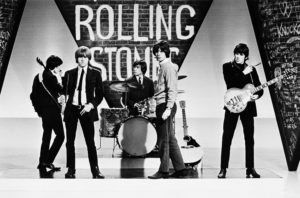
Well, four months later, the Rolling Stones come, and you know, they don’t have the same clothes on, and, you know, the hair’s messed up, and there’s no real harmony, and they made it look accessible, they made it look easier than it was. And most importantly, for me, Mick Jagger was the first guy I’d ever seen in show business who didn’t smile.
MD: Right.
LS: And that really affected me. I thought, you know, because – suddenly it wasn’t show business. Suddenly, it was a lifestyle. And that really got to me, because I wasn’t happy with show business, not really. But the lifestyle… it, I was, I was drawn to. So that was it for me – what we call the British Invasion, ’64, ’65. I mean, one great group after the other, it was amazing. It was a renaissance we were lucky enough to grow up in, and set our standards very high, which we still carry to this day.
MD: And you just performed with Paul [McCartney] – I Saw Her Standing There a little while ago. What was that like, for you?
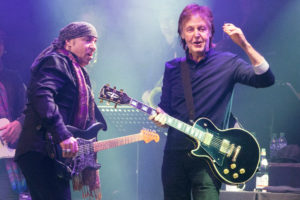
LS: Well… I mean, you kind of have to go into denial about…
MD: [Laughs] Right!
LS: You know, you can’t be that 12-year-old whatever, 13-year-old, you can’t go there. So you have to be more contemporarily… a colleague. But it was one of the thrills of my life. I mean, he came on stage with us, with Bruce, and then he invited me and Bruce to play with him at the [Madison Square] Garden in New York, and that was wonderful. But when he comes on my stage, you know, to endorse what I’m doing, personally, I mean… that was a whole ‘nother thing. That was really…quite moving, for me. And my life just went full circle, you know.
